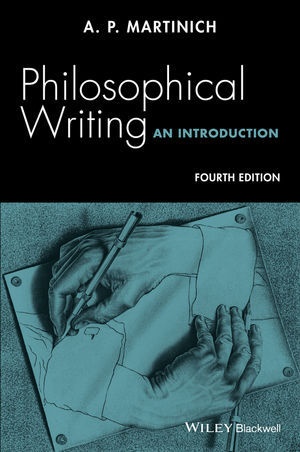Read more
Philosophical Writing: An Introduction, 4th Edition, features numerous updates and revisions to A. P. Martinich's best-selling text that instructs beginning philosophy students on how to craft a well-written philosophical essay.
* Features an entirely new chapter on how to read a philosophical essay, new sections on quantification and modality, and rhetoric in philosophical writing, as well as more updated essay examples
* Includes many new essay examples and an accompanying website with further topics and examples
* Traces the evolution of a good philosophical essay from draft stage to completion
* Emphasizes what a student should do in crafting an essay, rather than on what not to do
* Written with clarity and humor by a leading philosopher
List of contents
Note to the Fourth Edition x
Note to the Third Edition xi
Note to the Second Edition xii
Introduction 1
1 Author and Audience 8
1 The Professor as Audience 8
2 The Student as Author 11
3 Three Attitudes about Philosophical Method 15
2 Logic and Argument for Writing 17
1 What is a Good Argument? 17
2 Valid Arguments 21
3 Cogent Arguments 31
4 Quantification and Modality 35
5 Consistency and Contradiction 40
6 Contraries and Contradictories 43
7 The Strength of a Proposition 46
3 The Structure of a Philosophical Essay 51
1 An Outline of the Structure of a Philosophical Essay 51
2 Anatomy of an Essay 57
3 Another Essay 63
4 Composing 67
1 How to Select an Essay Topic 68
2 Techniques for Composing 69
3 Outlining 70
4 The Rhetoric of Philosophical Writing 70
5 Successive Elaboration 72
6 Conceptual Note Taking 81
7 Research and Composing 83
8 Sentences and Paragraphs 84
9 Polishing 87
10 Evolution of an Essay 89
5 Tactics for Analytic Writing 101
1 Definitions 102
2 Distinctions 108
3 Analysis 111
4 Dilemmas 119
5 Scenarios 123
6 Counterexamples 125
7 Reductio ad Absurdum 132
8 Dialectical Reasoning 138
6 Some Constraints on Content 146
1 The Pursuit of Truth 146
2 The Use of Authority 147
3 The Burden of Proof 150
7 Some Goals of Form 152
1 Coherence 152
2 Clarity 156
3 Conciseness 162
4 Rigor 165
8 Problems with Introductions 168
1 Slip Sliding Away 168
2 The Tail Wagging the Dog 173
3 The Running Start 175
9 How to Read a Philosophical Work 181
1 Find the Thesis Sentence 181
2 Precision of Words, Phrases, and Sentences 185
3 Proving the Case 186
Appendix A: "It's Sunday Night and I Have an Essay
Due Monday Morning" 190
Appendix B: How to Study for a Test 193
Appendix C: Research: Notes, Citations, and References 195
Appendix D: Philosophy Resources on the Internet, by Neil Sinhababu 201
Appendix E: On Grading 205
Appendix F: Glossary of Philosophical Terms 208
Index 218
About the author
A. P. Martinich is Roy Allison Vaughan Centennial Professor in Philosophy and Professor of History and Government at the University of Texas at Austin. His publications include
The Two Gods of Leviathan (1992) and
Hobbes: A Biography (1999); and, as co-editor,
A Companion to Analytic Philosophy (Blackwell, 2001),
Analytic Philosophy, 2nd ed. (Wiley Blackwell, 2012), and
The Philosophy of Language, 6th ed. (2013). Martinich is also Vice-President of the Board of Directors of the
Journal of the History of Philosophy. Martinich has also contributed to
The Philosophers' Magazine and
Think.
Summary
Philosophical Writing: An Introduction, 4th Edition, features numerous updates and revisions to A.P. Martinich s best-selling text that instructs beginning philosophy students on how to craft a well-written philosophical essay.
Report
"This new edition of Martinich's classic handbook is a treasure-trove of clear and intelligent advice about how to write philosophy essays. It is the product of decades of reflection by a master teacher about how to help students master the skills of philosophical thinking, reading, and writing. With excellent exposition and illuminating examples Martinich talks through the process of writing a quality philosophy essay, and the book is filled with excellent advice, bits of wise guidance, warnings, and helpful strategies. Teaching philosophy typically involves written assignments, and there are few places to turn for help about how to write an excellent philosophical essay. Martinich's book is simply the best book available on the subject. Part of the book deals with informal logic and the process of argumentation, but to me the most helpful chapters deal with composition and the process of writing itself - of identifying a topic, arriving at a theme or problem for a paper, developing a strategy for dealing with it, and writing coherent paragraphs and beyond. Martinich takes the whole process seriously and walks the student through it with wit, sensitivity, and attention to detail. All of us have students who can benefit from Martinich's guidance. Writing with such clarity and sensitivity about how to think and write philosophy is a remarkable achievement; the book is a resource that every philosophy teacher should know and recommend." Michael Morgan, Indiana University
"There are several introductory texts to philosophical writing; Martinich's is the best. Clear, concise, and cogent, Martinich not only discusses the qualities of good philosophical writing but, as always, displays them in a work that undergraduates from all disciplines can read with great benefit." Mark Bernstein, Purdue University

